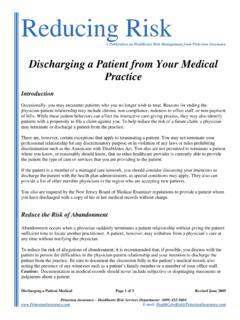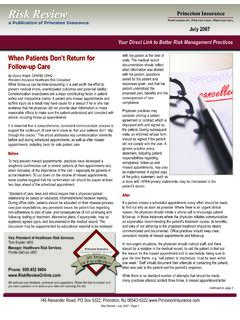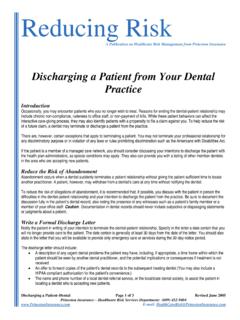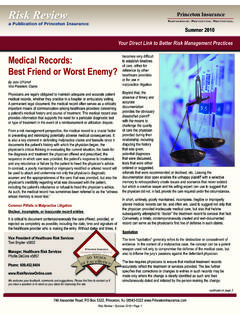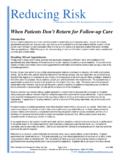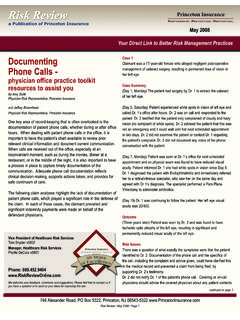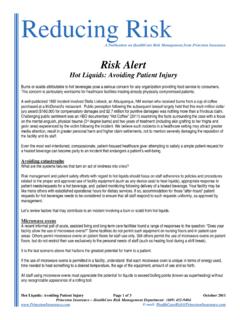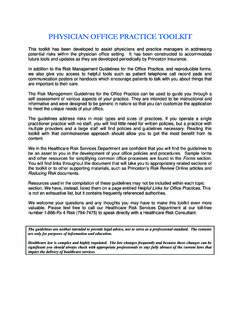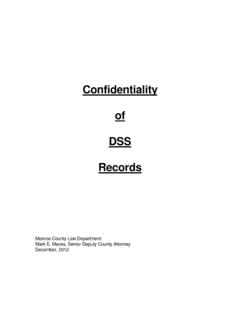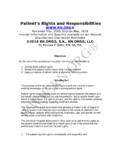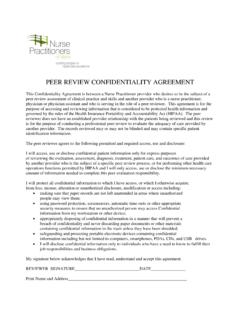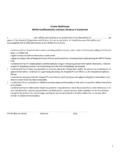Transcription of Subpoenas for Medical Records in New Jersey State Court ...
1 Reducing Risk A Publication on Healthcare Risk Management from Princeton Insurance Subpoenas for Medical Records Page 1 of 4 Revised August 2005 Princeton Insurance Healthcare Risk Services Department: (609) 452-9404 E-mail: Subpoenas for Medical Records in New Jersey State Court Civil Actions General Information Physicians and other healthcare providers often receive Subpoenas directing them to produce Medical Records and to testify regarding patient care they provided. It is important that practitioners know the purpose of a subpoena and their duties and rights in responding to one, as well as their legal obligations to protect the confidentiality of patients Medical Records . A healthcare practitioner may release Medical Records anytime upon receipt of a HIPAA-compliant, signed authorization from a patient or the patient s authorized representative.
2 Records specified in the patient authorization must be produced, including reports and letters from other providers. New Jersey State Board of Medical Examiners regulations require that a copy of the requested Records be supplied within 30 days of receipt of the request and permit a charge of $ per page, with a maximum charge of $100 and a minimum charge of $ A subpoena is a command for a person to appear at a specified time and place to give testimony. Despite its appearance and legal language, it is not reviewed or issued by a judge, unless otherwise indicated. Subpoenas may be served in civil (non-criminal), criminal, and administrative agency proceedings. Subpoenas are either for discovery (deposition) or trial purposes. A subpoena ad testificandum requires that the subpoenaed person give testimony.
3 A subpoena duces tecum requires that the individual testify and produce specified documents or other evidence at that time. Medical Records may be subpoenaed for production only at the time testimony is to be given for a deposition or for a trial. A subpoena for drug or alcohol abuse-related treatment Records generally is invalid on its own unless accompanied by a Court order directing the production of the Records . Unlike a subpoena, a Court order is issued by a judge who reviews the request and may conduct a hearing on the matter. A Court order directing a healthcare practitioner to produce Medical Records must be followed. The majority of Subpoenas served on healthcare practitioners in New Jersey are issued in State and federal Court civil actions.
4 A subpoena issued by the Federal District Court for the District of New Jersey in a civil action has legal force in the entire State . A subpoena served by a federal Court in a criminal action has legal force anywhere in the US. Federal courts outside the State of New Jersey have jurisdiction in civil actions over individuals who reside, work or do business within 100 miles of the Court proceeding. Subpoenas from State courts and administrative agencies outside New Jersey are without effect in New Jersey . Reducing Risk Subpoenas for Medical Records Page 2 of 4 Revised August 2005 Lessons from the Crescenzo v. Crane Despite the official appearance and legal language of a subpoena, a prudent healthcare practitioner will not assume that a subpoena is valid and must be honored without question.
5 Releasing a patient s Medical Records in response to a subpoena that is not accompanied by a signed authorization from the patient may place a practitioner in legal and professional jeopardy. Case The risks of doing so are dramatically presented in the case of Crescenzo v. Crane, 350 Super. 531 (App. Div. 2002), cert. den. 174 364 (2002) in which the appellate Court ruled that physicians can be legally liable for disclosing Medical Records in response to an improper subpoena without the patient s consent or knowledge. In Crescenzo, the attorney for a husband in a divorce action served the wife s family practice physician with a subpoena duces tecum for the wife s Medical Records which contained notes regarding treatment for depression.
6 The subpoena did not satisfy the legal requirements for a valid subpoena, and it was not accompanied by a signed authorization from the wife permitting the release of her Medical Records . No notice of a scheduled deposition was included with the subpoena. A cover letter sent by the attorney with the subpoena stated that if the doctor forwarded the Medical Records , there would be no need for his testimony. The attorney did not obtain an authorization from the wife for the release of her Medical Records , nor did he send a copy of the subpoena cover letter to either his opposing counsel or the wife. The physician forwarded the Records to the husband s attorney who later introduced them at a custody hearing as evidence on the issue of the wife s fitness as a parent.
7 The wife sued her physician for claims arising from the disclosure of her Medical Records including Medical malpractice; breach of confidentiality ; and violation of the physician-patient privilege. She later moved to amend her complaint to add a claim against her husband s attorney. The trial Court dismissed the plaintiff s action. The Appellate Division Court reversed the decision of the trial Court and permitted the plaintiff to pursue her claims against both her physician and the attorney. The appellate Court specifically rejected the physician s argument that failure to comply with the subpoena would have placed him in legal jeopardy and he could have been held in contempt of Court . The appellate Court noted several options available to a physician to resolve a conflict between preserving the confidentiality of a patient s Medical Records and complying with a subpoena for the Records : Obtain a signed authorization from the patient Contact the patient or the attorney who served the subpoena Seek legal advice from personal counsel before responding to the subpoena Pursuing any of the above options would have revealed the legal deficiencies with the subpoena and averted the legal claims against the physician for the disclosure of his patient s Medical Records .
8 A Valid Subpoena A valid subpoena in a civil action in the Superior Court of New Jersey ( State Court ) must meet the following requirements: Be served in person by an individual at least 18-years-old Name on its face the Court and the title of the action, including names of the parties and the Court docket number and type of action (civil, criminal or administrative) Be signed by either the clerk of the Court or by an attorney for one of the parties, or by a party in the name of the Court clerk, and list the address and telephone number of the attorney or party who issued the subpoena Direct properly when and where the witness is to appear: Trial anywhere within New Jersey Deposition the county in which the witness lives, works or does business in person and only at a reasonably convenient time State Agency Be accompanied by payment of a witness fee and mileage anywhere within New Jersey consistent with the agency s powers Reducing Risk Subpoenas for Medical Records Page 3 of 4 Revised August 2005 A Valid Subpoena Duces Tecum In addition to the general requirements for a valid subpoena, the New Jersey Rules of Court specify the requirements for a valid discovery subpoena in a civil action in the New Jersey State courts.
9 Rule 4:14-7(c) which pertains to a subpoena duces tecum requires: The subpoena must compel attendance at a deposition simultaneously with the production of the subpoenaed evidence at a designated time and place The subpoena must State that the subpoenaed evidence shall not be produced or released until the date specified for the deposition The subpoena must State that if the subpoenaed witness is notified that a motion to quash the subpoena has been filed, the subpoenaed evidence shall not be produced or released until ordered by the Court , or all parties to the action consent to the release The subpoena must be served simultaneously at least 10 days prior to the date of the scheduled deposition on the witness and all parties to the action who shall have the right to inspect and copy the subpoenaed evidence If evidence is produced by a subpoenaed witness who does not attend the deposition, the party who receives the evidence must notify all the other parties of the nature and contents of the evidence, and make it available for inspection and copying.
10 A witness subpoenaed to give deposition testimony may also be entitled to additional fees including reimbursement for out-of -pocket expenses and lost earnings. A Note of Caution: Some attorneys disregard the Court rules and attempt to improperly use a subpoena duces tecum to obtain Medical Records without paying for them. A discovery or Records subpoena improperly directs a physician to produce a copy of a patient s Records and send them to the attorney s office in lieu of attendance at a deposition. This practice is not sanctioned by the courts. If served with such a subpoena, contact the attorney who served the subpoena. Request that the attorney either provide a signed authorization from the patient and payment of the fee allowed by the Board of Medical Examiners regulations, or that the Records be produced at a deposition or trial.
